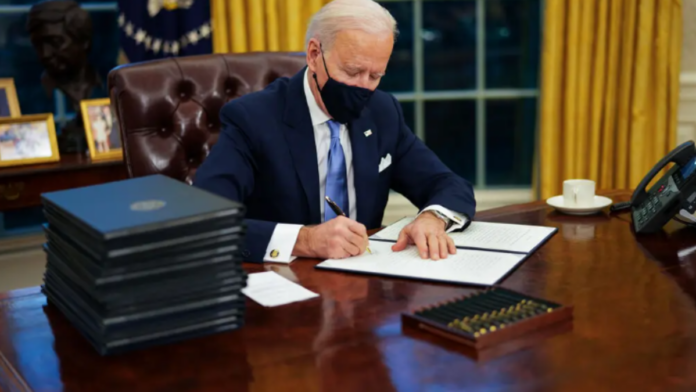Top Democrats from a powerful House committee sent a request for information to the Environmental Protection Agency last week regarding correspondence the agency had with outside groups and other internal documents before announcing several rollbacks of environmental regulations.
“We write to express our deep concerns about actions taken by the Environmental Protection Agency (EPA) to roll back policies to reduce greenhouse gas emissions and address our changing climate,” the members wrote in a November 20 letter addressed to acting EPA Administrator Andrew Wheeler. “The tragic human and financial costs of unchecked climate change are high and increasing fast, and unfortunately the Administration’s actions for the last two years are only exacerbating these conditions. To that end, we request information so the Committee can evaluate these new proposals and their consequences for public health and the environment.”
The letter was signed by U.S. Reps. Frank Pallone (D-N.J.), Ranking Member of the Energy and Commerce Committee; Diana DeGette (D-Colo.), Ranking Member of the Subcommittee on Oversight and Investigations; and Paul Tonko (D-N.Y.), Ranking Member of the Subcommittee on Environment. Rep. Pallone is expected to be the next chairman of the Energy and Commerce Committee.
The members pointed to the most recent United Nations’ Intergovernmental Panel on Climate Change report, released last month, which warned that expected temperature increases will lead to water shortages, heat waves, and “life-threatening flooding.”
“The Trump Administration abdicated the United States’ role as a global leader on meaningful climate action by announcing its intention to withdraw the United States from the landmark Paris Climate Accord and disregarding consensus that humans are a major driver of global warming,” the letter alleges. “At the same time, EPA has engaged in the systematic dismantling of critical climate initiatives and public health protections. Furthermore, EPA continues to champion policies that would result in massive increases in greenhouse gas emissions with no regard for the associated climate or public health impacts.”
The letter references three areas where EPA reduced regulations: The Safer Affordable Fuel-Efficient (SAFE) Vehicles Rule for Model Year 2012-2016; The Affordable Clean Energy (ACE) Rule; and the Oil and Natural Gas Sector Emission Standards for New, Reconstructed, and Modified Sources Reconsideration, or the Methane Replacement Rule. Isolating these three regulatory areas is an indication of where Democrats may set their oversight priorities when they take back the gavel in the 116th Congress.
In September, the EPA announced proposed changes to methane regulations implemented by the Obama Administration in 2016, which had imposed stricter rules on industry with regards to inspecting equipment and detecting and repairing leaks, the ultimate goal being a reduction in overall emissions.
According to the EPA, the move to alleviate these regulations would “streamline implementation, reduce duplicative EPA and state requirements, and significantly decrease unnecessary burdens on domestic energy producers.” By EPA’s estimates, the updated policy will save “$484 million in regulatory costs from 2019 – 2025 or $75 million annually.”
Earlier this month, the EPA held a field hearing in Denver to receive feedback on the proposed changes to methane regulations. Industry representatives testified that EPA was “on the right track” with their new policies, and also highlighted strides that companies have made in reducing emissions through technological innovation.
“EPA is on the right track in revising OOOOa, as the changes proposed are designed to fix many of the technical issues with the rule, but more importantly there is a recognition of the role of the oil and natural gas industry as the number one reason the United States has reduced greenhouse gas emissions more than any other country. Largely because of fuel switching from coal to natural gas which has significantly reduced emissions in the electricity sector, the United States’ CO2 emissions have decreased 14% since 2005,” said Stuart Siffring, regulatory analyst with Western Energy Alliance during his testimony.
Western Wire is a project of Western Energy Alliance.
“[O]ur objective has remained the identification of cost-effective emission control requirements that reduce VOC [volatile organic compound] emissions for new and modified sources and, as a co-benefit, also reduce methane. This approach, when combined with the leadership the industry has demonstrated to voluntarily reduce emissions from existing sources, has already proven effective,” said Matthew Todd, Senior Policy Advisor with the American Petroleum Institute, during the hearing.
EPA’s 2018 report on greenhouse gas emissions shows steady methane reductions across several western oil and gas producing regions including the San Juan Basin in New Mexico, Permian Basin in southeast New Mexico and west Texas, Utah’s Uinta Basin and Colorado’s Denver-Julesburg Basin.
The report attributed reductions to “advances in technology and changes in the way wells are drilled.”
However, the Democrats’ letter still raises concern about the impact of lifting the 2016 methane regulations.
“EPA’s proposed Methane Replacement Rule rolls back existing safeguards which would reduce methane emissions from the oil and gas industry by 40 percent from 2012 levels by 2025,” the letter said. “If finalized, this rollback would also undermine critical public health protections from other harmful pollutants like benzene and volatile organic compounds.”
The members are requesting information surrounding how these policy decisions were made—in the form of presentations, memorandums, briefings and communications with stakeholders—be turned over by Tuesday, December 4.

